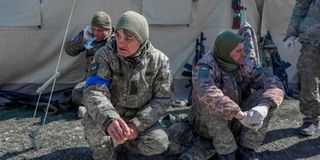Russia-Ukraine war changes tech terrain

Ukrainian soldiers sit next to the military school hit by Russian rockets the day before, in Mykolaiv, southern Ukraine, on March 19, 2022.
What you need to know:
- Before the war broke out, Ukraine was a major provider of in-person and remote technical support to many countries
- Countries that once depended on it are now looking elsewhere, thus stimulating the demand for IT talent in other parts of the world.
As the Russia-Ukraine conflict continues, its effects are being felt in homes throughout the world, both the negative ones and some bright spots. Western countries have turned their backs on Russian oil as a result of this crisis. Consequently, petroleum prices have shot up to historic highs.
The increase in petroleum prices has a silver lining. It has jolted people who previously did not pay much attention to electric cars to be more interested in them. Since electric vehicles use less fuel and are less expensive to run than their petrol-powered counterparts, electric cars are becoming increasingly popular.
But there is one problem. The chips shortage that started two years ago continues to bite. Due to this shortage, electronic car manufacturers cannot meet the increasing demand, pushing up car prices. A few countries with the financial muscle to build chip production factories are retrofitting their existing factories and building new plants to meet the swelling demand.
Information is the lifeline of governments and businesses in this century. Timely and accurate information becomes especially useful in disasters such as wars, disease outbreaks, and related calamities. Unlike the old-style information-gathering methods where journalists travelled to war-torn countries to collect information, many media outlets are now using social media to corral content for broadcast.
To get a grip on the unfolding Ukraine crisis, many organisations rely on information posted on the internet by smartphone-toting citizens. The use of sophisticated artificial intelligence tools makes this analysis possible in remarkable ways. These tools consume vast amounts of data and produce useful information that helps shape decisions.
Training the fighters
Before the war broke out, Ukraine was a major provider of in-person and remote technical support to many countries, providing information technology expertise. The Ukraine tech market is now in a state of disarray. Countries that once depended on it are now looking elsewhere, thus stimulating the demand for IT talent in other parts of the world.
In recent years, virtual reality and augmented reality have been in vogue due to their ability to simulate processes that humans can't. In a war, training the fighters is a priority, but it's also a delicate dance given the volatility of the situation.
The Russians and Ukrainians have resorted to virtual reality to train their fighters. In addition, medical personnel use these technologies to treat injured soldiers on the frontlines where supplies, equipment, and specialists are in short supply.
Additionally, as the war rages, Europe and North America are struggling with heightened cybersecurity, which is often the work of rival states. Experts in ethical hacking, malware analysis, and cyber security are in high demand.
In an era when countries continuously size each other up, cyber warfare remains a threat that can cause incalculable damage. A steady supply of top-shelf cybersecurity experts and allied tools cannot be overstated.
Mr Wambugu is an Informatician. Email: [email protected] Twitter: @Samwambugu2





